About the Program
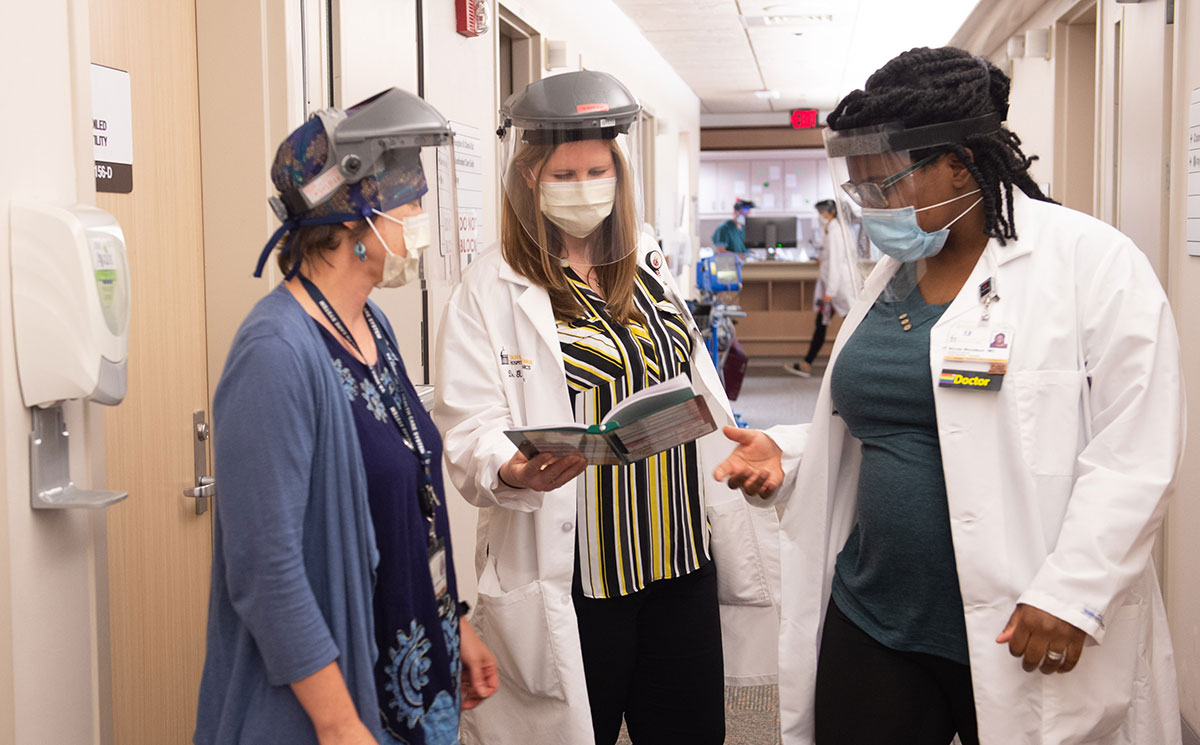
We invite you to consider the advantages of a program that allows you to:
- Develop expertise in the diagnosis and treatment of mental illness in primary care populations
- Improve management of medical problems in the chronically mentally ill living within the community
- Gain skills as a psychiatric consultant to medical physicians
- Participate in the integration of medicine and psychiatry in our future health care system
Trainees in our five-year combined training program spend six months in each specialty annually for a total of 30 months in family medicine and 30 months in psychiatry.
Welcome
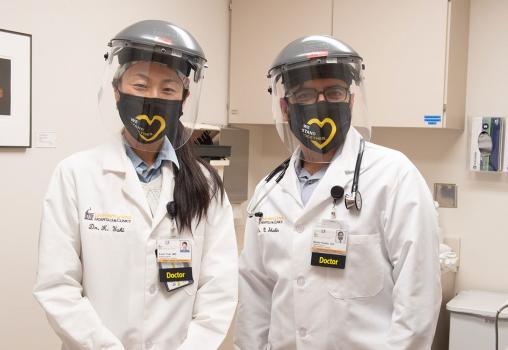
Thank you for your interest in the Family Medicine-Psychiatry Residency Program at University of Iowa Hospitals and Clinics.
Our five-year program offers combined training that prepares you to practice simultaneously as a family physician and psychiatrist. Developed through a collaboration between George Bergus, MD, professor in the Department of Family Medicine, and William Yates, MD, former professor in the Department of Psychiatry, the program enrolled its first residents in 1998. Monika Jindal, MD is the current program director.
A critical element of our program's success is that both of our sponsor departments remain steadfast in their support for combined training. Resident education is a priority, and our residents get to fully participate in learning activities in both departments. Moreover, our community of dually-trained faculty members continues to grow. A total of seven faculty members have completed combined training in either family medicine-psychiatry or internal medicine-psychiatry, many at the University of Iowa Hospitals and Clinics.
We encourage you to explore our website and contact us with any questions you may have for our residents and/or program director.
Why Iowa?
Our program will expose you to the widest range of patients and learning situations. Our community will provide a high quality of living. And you'll find a salary and benefit package that competes favorably with accredited programs in an academic medical setting.
Our Facilities
On any given day at UI Hospitals & Clinics more than 9,000 employees, students, and volunteers collaborate to provide safe, quality health care to our patients. This is a major regional referral center with a large patient base and incredible interdisciplinary learning opportunities.
Our Graduates
Include researchers, academic faculty, public health officials and at least one Fulbright scholar. Our program prepares residents to be leaders in their field. We are proud of their successes and fortunate to count such an accomplished pool of alumni as a resource for current residents.
Iowa City, Iowa
Not just a college town, Iowa City is North America's first and oldest UNESCO City of Literature. It is regularly named as a top small metro area in the U.S. due to its low cost of living, short commutes, and large variety of affordable recreational activities.
Benefits
Our competitive stipends and excellent benefits add to our residents' quality of life. Read more specific information regarding benefits.
Frequently Asked Questions
Combined Training: FAQ
What is combined training?
Combined training allows residents to train in two to three specialties simultaneously and leads to board eligibility in these specialties. Some combined training options include family medicine-psychiatry, internal medicine-psychiatry, neurology-psychiatry, and pediatrics-psychiatry-child and adolescent psychiatry.
University of Iowa Hospitals & Clinics offers combined training in family medicine-psychiatry and internal medicine-psychiatry. Combined training allows residents to develop a blended practice and typically takes five years to complete, making it more efficient than completing six to seven years of categorical residency programs.
How much time will I spend in each specialty?
At the University of Iowa Hospitals & Clinics, our residents alternate between family medicine rotations and psychiatry rotations (six months in each specialty per year) for a total of 30 months in each specialty.
Is there sufficient patient volume so that I can have multiple exposures to a variety of diseases?
Yes–as both the main source of health care for the local community and the regional referral center for portions of three states, we see high volumes of both healthy, low-complexity patients and those with much more challenging disease presentations.
How diverse is your patient population?
More diverse than you might expect! Our hospital is located in Iowa City, which is wealthy, highly educated, and majority white (80%). However, the community we serve stretches far beyond the town itself and includes a large number of recently-resettled refugees (mainly from central and eastern Africa), undocumented immigrants from Central America, rural factory and farm workers, and several nearby Amish and Mennonite settlements.
How diverse is your residency?
Our residency program is made up 60% Caucasian, 10% African American, 20% Asian, and 10% Middle Eastern. Additionally, many of our residents are bilingual and speak Spanish, Chinese, Russian, Italian, and Japanese.
What is your call schedule like?
Combined residents take call for the service on which they are currently rotating. Both family medicine and psychiatry have night float services.
Psychiatry junior residents take approximately one five-hour evening call shift per week and one twelve-hour weekend call shift per month. Senior residents in psychiatry take home backup call only.
Family medicine residents take in-house weekend call throughout residency and the number of shifts is split evenly among residents, with combined residents typically taking half the number of shifts per year as full-time family medicine residents.
Pediatrics, general surgery and the surgical ICU have their own call schedules, which residents will follow when rotating on those services.
What are the elective opportunities?
Residents have done a number of electives including geriatrics, international medicine, research, and specialty electives like EKG, nephrology, and endocrinology. Residents also have the opportunity to do away electives to further develop their specific interests.
 Do you have a research project requirement for graduation?
Do you have a research project requirement for graduation?
Our program does not have a research requirement for graduation, but residents are expected to participate in scholarly activities, including a quality improvement project in their second year.
What fellowship opportunities are available?
Graduates of our program may choose to pursue fellowship training in a number of areas of interest, including addiction medicine, geriatrics, child and adolescent psychiatry, palliative medicine, sports medicine, global medicine, sleep medicine, LGBTQ, and research.
Where do combined trained residents work?
The opportunities are limitless for residents who complete combined training in family medicine and psychiatry. While some residents may choose to work strictly in one specialty, others may choose to mix the two specialties together. Either way combined training allows a clinician to feel comfortable providing a medical consultation in a psychiatric setting or providing a psychiatric consultation in a medical setting.
Our graduates have gone on to work in:
- Academia
- Palliative care units
- Student health centers
- Private practices in family medicine, psychiatry, or both
- Consultation-liaison psychiatry
- Emergency psychiatry
- Forensic psychiatry
- Addiction medicine
- Military medicine
- Geriatrics
Is this a family friendly program?
Yes, the residency is supportive of residents in their efforts to balance work with family life. We have several physician residents with young families and understand the stresses associated with attempting to find a balance. In fact, 70% of our graduates had a child during residency.
Women residents receive up to six weeks of paid maternity leave after delivery. Men get five working days off for paternity leave. The house staff health insurance policy provides full coverage for spouses and children. There are also several childcare facilities near the hospital and one on-site.
Is there an elective for medical students interested in combined training?
We offer an elective rotation in combined care to fourth-year medical students at the University of Iowa or qualified visiting medical students.
Iowa City: FAQ
Where is Iowa City?
Iowa City is 220 miles west of Chicago–about a four-hour drive. It is within a similar driving range of a number of other larger cities, including Minneapolis, Milwaukee, Omaha, and St. Louis.
It is home to the University of Iowa and mixes big-city opportunities with the friendliness and convenience of a small town. It has a low crime rate, short commutes, a reliable bus system and a large network of well-maintained public parks.
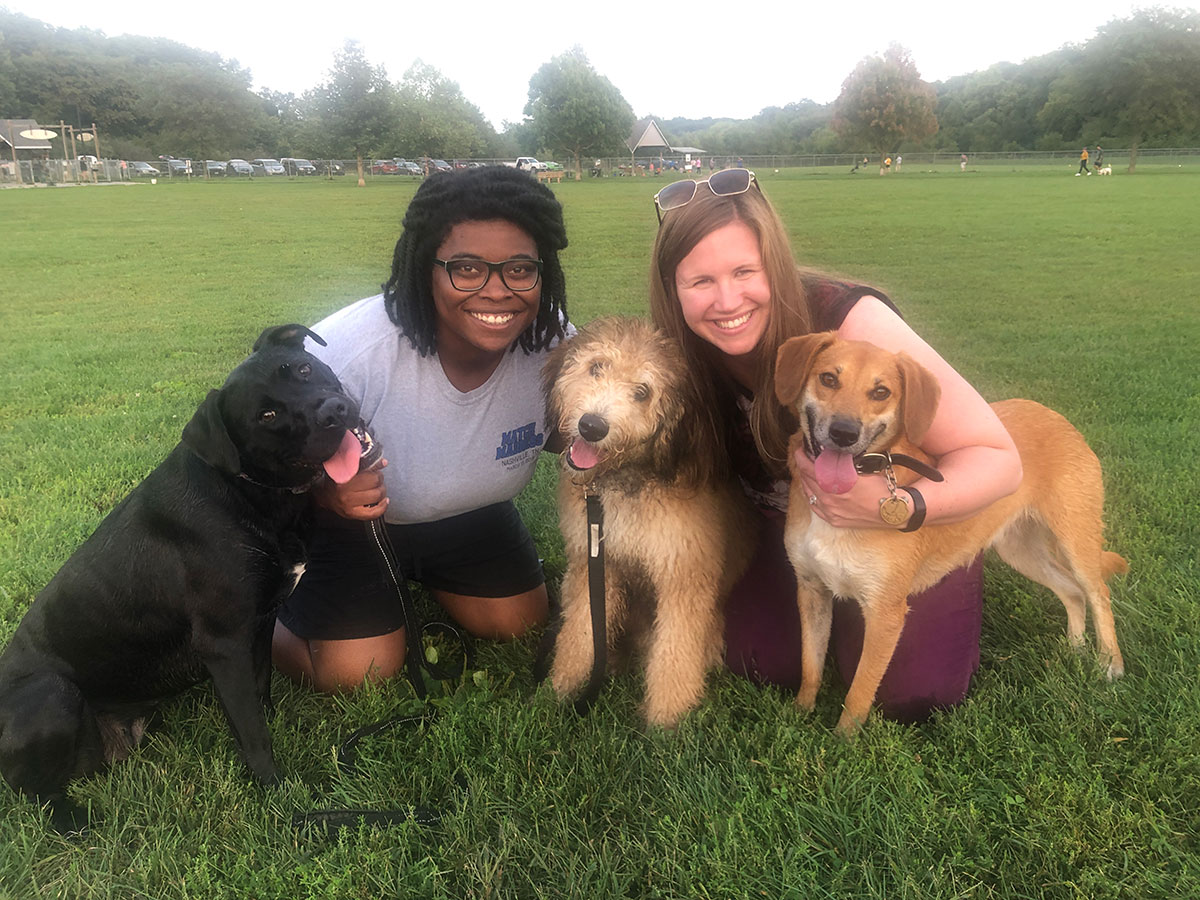
What is there to do in Iowa City when you're not working?
There are 15 different festivals and art fairs, plus concerts and race events. There are many music venues, sports events, and neighborhood street fairs and garden walks.
We also have a really big mall and several smaller ones, 41 parks, nine golf courses, six public tennis courts, six public pools, lakes and a reservoir with trails, camping, and boating. There are bike trails, famous bookstores, many galleries, and excellent museums.
There are half a dozen or more performing arts venues including Hancher Auditorium. There's always something going on. Find more information from the Iowa City/Coralville Convention and Visitors Bureau.
Are there any job opportunities for my spouse/significant other?
Yes! Iowa boasts one of the lowest unemployment rates in the nation and the university has an office specifically dedicated to helping partners of recently-hired employees find work. For more information, check out the University of Iowa's Human Resources Dual Career Services.
What's Iowa City like for kids and families?
A whirlwind of opportunities! Iowa City's public schools are frequently ranked among the top in the nation, and have a wide range of services available to students with disabilities as well. Outside of school, families can enjoy the area's nine museums, excellent library system, frequent kid-friendly festivals, and numerous public recreation areas!
Medical Student Elective
The Departments of Family Medicine and Psychiatry offer a one-month elective in combined care to fourth year medical students at the University of Iowa or qualified visiting medical students.
Students work primarily with combined faculty and residents in the Family Medicine Clinic and Family Medicine Psychiatry, our primary care mental health clinic. Students interested in a particular area of combined care should communicate their interest(s) when applying for the elective so the appropriate arrangements can be made with specific faculty or clinics. Monika Jindal, MD, is the rotation director.
Medical students interested in family medicine and/or psychiatry may also consider participating in categorical electives offered by each department.
For more information on medical student education in each department, please visit:
Training Overview
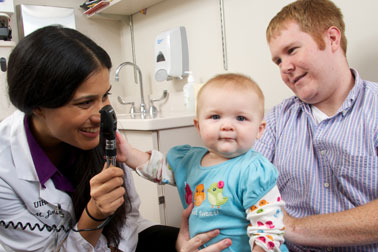 The Family Medicine-Psychiatry Residency Program at the University of Iowa Hospitals & Clinics is designed to provide residents with the training experiences they need to be able to sit for board certification in both family medicine and psychiatry by the end of the five-year program. Residents meet the individual residency training requirements in each specialty. The curriculum is reviewed regularly, and modified to keep up with current training requirements in each specialty, as directed by the Accreditation Council for Graduate Medical Education (ACGME).
The Family Medicine-Psychiatry Residency Program at the University of Iowa Hospitals & Clinics is designed to provide residents with the training experiences they need to be able to sit for board certification in both family medicine and psychiatry by the end of the five-year program. Residents meet the individual residency training requirements in each specialty. The curriculum is reviewed regularly, and modified to keep up with current training requirements in each specialty, as directed by the Accreditation Council for Graduate Medical Education (ACGME).
Clinical experiences combined with formal teaching are the foundation of the program. Residents have six months of clinical rotations, with lectures and conferences, in each specialty annually. Over the five-year program, residents complete a total of 30 months in family medicine and 30 months in psychiatry.
In order to integrate these two specialties into a focused clinical practice, our residents also participate in some unique training experiences. These include a program-specific continuity of care clinic beginning in second year, an annual program retreat and attendance at the annual meeting of the Association of Medicine and Psychiatry, in addition to ongoing group social and volunteer activities.
Download or view Family Medicine-Psychiatry Residency Curriculum (2023-2024)
Community Involvement
Our residents enjoy spending time together and being involved in our local community. Enjoy the photo gallery above by choosing a thumbnail and scrolling each photo.
Popular activities include:
Continuity of Care Experiences
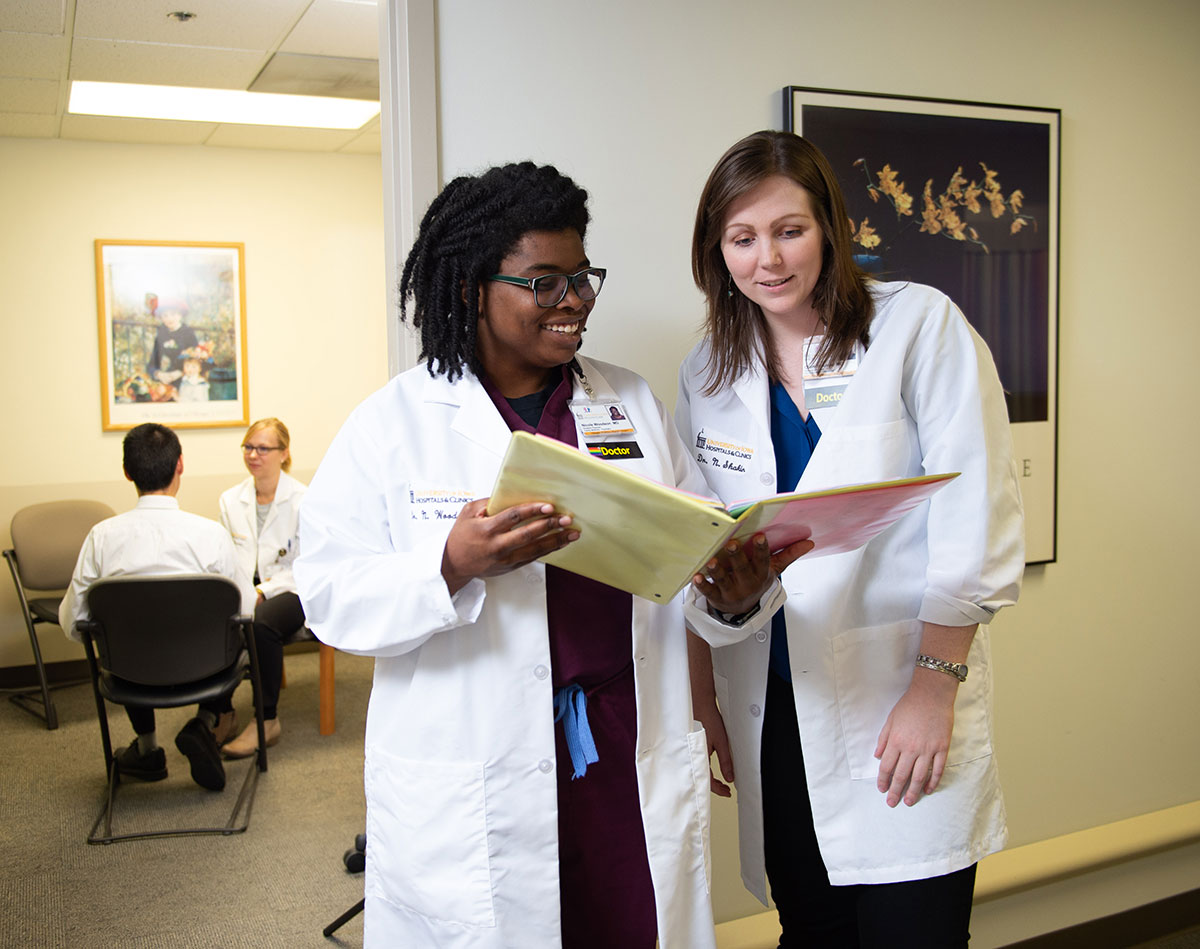
Continuity of care is crucial to the family medicine-psychiatry combined training experience. As such, residents participate in multiple longitudinal experiences throughout their time at University of Iowa. Family medicine continuity clinic begins in the first year of residency and takes place at the main Family Medicine Clinic, located within University of Iowa Hospitals & Clinics. Also, at the beginning of second year, residents begin seeing patients in their psychiatric continuity clinic, located at the Scott Boulevard clinic and staffed by Victoria Tann, MD, and Monika Jindal, MD, both of whom have combined family medicine-psychiatry training. The family medicine and psychiatry continuity clinics continue throughout the remainder of residents' training time.
As seniors, residents will spend a full year in a continuity experience in outpatient psychiatry, with time split between the UI Hospitals & Clinics adult psychiatry clinic and the VA adult psychiatry clinic. During this year residents also have the option to take longitudinal elective rotations in substance use/MAT clinic, women's health, child psych, geri/neuro, and more. This year is also the heart of residents' training in psychotherapy, and a minimum of one half-day per week is dedicated to seeing patients for individual therapy and discussing cases with an assigned supervising clinician.
The curriculum offers several additional continuity experiences, as several related required rotations are grouped together and spread out over 12 weeks (instead of four), giving residents more opportunities to see returning patients.



